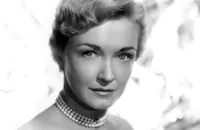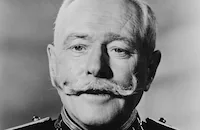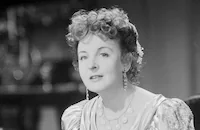My Name Is Julia Ross

Brief Synopsis
Cast & Crew
Joseph H. Lewis
Nina Foch
Dame May Whitty
George Macready
Roland Varno
Anita Bolster
Film Details
Technical Specs

Synopsis
Out of work following an appendectomy, Julia Ross desparately scans the classified ads in search of a job. Attracted by a notice from the Allison Employment Agency, Julia proceeds to their office, where she is interviewed by Mrs. Sparkes, who is looking for a private secretary for Mrs. Williamson Hughes. Upon ascertaining that Julia has no family, Mrs. Sparkes hires her and instructs her to move into the Hughes home that evening. After Julia leaves the office to pack her bags, Mrs. Sparkes informs Mrs. Hughes that now that they have found a candidate, they can close the agency. As Julia gathers her belongings at Mrs. Mackie's rooming house, she runs into her former beau, Dennis Bruce, and they make a date for the following evening. Before leaving, Julia hands Bertha, Mrs. Mackie's maid, her back rent and a forwarding address. Bertha, who thinks that Julia is condescending toward her, pockets the money, however, and tears up the address. That night, while Julia slumbers at her new residence, her purse and clothing are removed from her room and destroyed. After Julia fails to keep her date with Dennis, he goes to the Hughes's house and is informed by a police officer that Mrs. Hughes and her son Ralph have moved. When Dennis questions Mrs. Mackie about Julia's forwarding address, Bertha admits to tearing up the paper that Julia entrusted to her. Bertha mentions that Julia got her job through the Allison Employment Agency, so Dennis visits the agency and discovers that it has closed. The next day, Julia awakens in a strange room and discovers that she is dressed in a nightgown monogrammed with the initials "M. H." Soon after, a nurse named Alice enters her room and addresses her as Mrs. Hughes. When Julia becomes agitated, the nurse summons Julia's "husband", and Ralph and his mother appear at the doorway and call her Marion. After Julia demands an explanation, Mrs. Hughes states that Julia is mentally deranged and believes that she is someone else. When Mrs. Sparkes enters the room and identifies herself as the Hughes's housekeeper, Julia realizes that she is being held prisoner in a sinister seaside mansion. That night, Julia is awakened by a shadowy hand, and when she sees a man's reflection in her bedstand mirror, she screams. Drawn by Julia's shrieks, Mrs. Hughes appears at the door and insists that Julia was simply startled by a prowling cat. After leaving Julia's room, Mrs. Hughes warns Ralph to be more prudent and confiscates a pocket knife that he has been nervously fingering. The next morning, Julia bolts out the front door and runs toward the gate, where she is stopped by the gatekeeper. When the man leaves his post to report to the house, Julia pencils a plea for help on a scrap of newspaper, wraps it around a rock and tosses it onto the road. Later, a car pulls into the Hughes's driveway, and Julia, thinking that it is the police answering her summons, eagerly greets them. Her hopes are dashed when the occupants of the car introduce themselves as Reverend Jonathan Lewis, his sister, Mrs. Susan Robinson, and his sister's husband. When Julia blurts out that she is being held prisoner, Mrs. Hughes declares that she is hysterical and suffering from a nervous breakdown. On the drive back to town, the reverend realizes that Julia is hiding in his backseat, turns the vehicle around and delivers her to Ralph. Back at the house, Mrs. Hughes and Ralph are plotting how to make Julia's murder appear as suicide when Mrs. Hughes discovers a plea for help that Julia has addressed to Dennis. After Mrs. Hughes removes the letter from its envelope and replaces it with a blank piece of paper, Ralph decides to mollify Julia by agreeing to drive her into town so that she can post the letter. Julia outsmarts them however, and discards the blank sheet, replacing it with another entreaty for help. Upon returning home that night, Julia hears the cat crying and finds him trapped behind a panel in the wall leading to a secret passageway. After taking a few steps into the passageway, Julia overhears Mrs. Hughes planning to murder her that evening. Ralph, who married his wife Marion for her money and then slashed her to death with his knife, is reassured by his mother that Julia's murder will be made to look like Marion's suicide. Desperate, Julia staggers back to her room and finds a bottle of poison. Upon discovering Julia's unconscious body, Mrs. Hughes calls a doctor to treat her, and when Julia regains consciousness, she tells the doctor that she did not ingest the poison. After informing the physician that Ralph killed the real Marion, she recounts sending the letter and asks him to hide her until Dennis arrives. The doctor is an impostor, however, and is really a man named Peters in the employ of Mrs. Hughes. After Mrs. Hughes sends Peters to London to intercept the letter, the real doctor arrives and Mrs. Hughes explains that Julia is insane. When the physician advises institutionalizing her, Mrs. Hughes asks him to return the next day. Meanwhile, Peters arrives in London and gains entry into Mrs. Mackie's boardinghouse by feigning interest in renting a room. After pocketing Julia's letter, he leaves, but as soon as Mrs. Mackie realizes that a letter is missing, she calls the police. That night, as Julia awaits her demise, she blockades the door to her room and then pries the bars from her window. When she screams, Mrs. Hughes and Ralph break down the door and see her figure splayed on the rocks below. At the break of dawn, the doctor arrives with his nurse and Mrs. Hughes informs him that Marion has committed suicide. To make sure that Julia is dead, Ralph runs to her body and is about to bludgeon her with a rock when a police officer, accompanied by Dennis, appears and announces that he is under arrest. After Julia climbs to her feet and explains that the figure he saw was only her robe and that she hid in the secret passageway until Dennis and the police appeared, Ralph knocks over the police officer and flees. Taking aim, the officer fells Ralph with a bullet. Dennis then drives Julia back to the sanity and security of London, and when he proposes that she become his wife, she accepts.

Director

Joseph H. Lewis
Cast

Nina Foch

Dame May Whitty

George Macready
Roland Varno
Anita Bolster

Doris Lloyd

Leonard Mudie
Joy Harrington

Queenie Leonard
Harry Hays Morgan
Ottola Nesmith
Olaf Hytten
Evan Thomas
Marilyn Johnson
Milton A. Owen
Leland Hodgeson
Reginald Sheffield
Charles Mcnaughton
Crew
Gert Anderson
M. R. Bakaleinikoff
Henry Batista
Muriel Roy Bolton
Larry Butler
Lambert Day
Milton Feldman
Don Glouner
Burnett Guffey
Wallace Macdonald
Vera Mikol
Jerome Pycha Jr.
Glenn Rominger
Milton Stumph
Edwin Wetzel

Photo Collections
Videos
Movie Clip




Trailer
Film Details
Technical Specs

Articles
My Name is Julia Ross
He had more than 20 features to his credit when he was handed the script that would give him the opportunity to bring his experiments together in a single, stand-out film: My Name Is Julia Ross, a modest little thriller made for Columbia's B-movie unit. The story is a gothic thriller about an unemployed London secretary hired as a live-in assistant to a seemingly sweet old lady. In fact, she's hired because she is a dead ringer for the dead wife of the old lady's psychotic son. Lewis was handed a solid script ("I didn't rewrite the script," he told interviewer Peter Bogdanovich, "the script came to me, and I would say it was a damn near perfect script") and cast that was a cut above the second-rate stars he usually worked with: cool, elegant starlet Nina Foch as Julia, Dame May Whitty (Miss Froy in Hitchcock's The Lady Vanishes [1938]) as the old lady with a cold, conniving mind under her charming front and George Macready (Gilda [1946]) as the mad son Ralph, creepily malevolent as he puts on a show of affection in her presence (and obsessively plays with knives in almost every other scene). The script, based on a novel by Anthony Gilbert, has a Gaslight quality to it. Julie goes to sleep in her employer's London home and wakes up in a mansion overlooking the Cornwall coast, where she's called Marion and told that she's the wife of Ralph. "You haven't forgotten us again, have you?" She's all but locked up in the house while mother and son convince the town that she has gone mad, and then plot her "accidental" demise.
Lewis' first film for the studio since 1939, My Name Is Julia Ross was part of the "fewer and better" B-movie initiative, with a bigger budget usually accorded such productions and a 12-day shooting schedule, twice as long as he was given for the westerns he used to crank out for the studio. Lewis made the most of his limited resources, with judicious use of stock footage and back projection to establish the London and Cornwall settings and careful backlot shooting to put the characters on English streets and country roads, or high upon a seaside cliff looking dramatically down at a rocky, lonely beach. He lavished his attention on the mansion sets, giving the interiors a distinctive sense of old-money history and aristocratic elegance; he also photographed many of the scenes framed by foreground objects or through doorways and windows (looking at Julia through the bars of her upstairs window brings the feeling of imprisonment home simply and evocatively). While the characters work to establish a surface of normalcy, Lewis injects a sense of unease into the situation with oblique angles and webs of shadows.
To get greater depth of focus (which would become a hallmark of Lewis' best work) he had cinematographer Burnett Guffey (then just another cameraman churning out low-budget features but later responsible for shooting In a Lonely Place [1950], From Here to Eternity [1953] and Bonnie and Clyde [1967]) flood the studio with extra lights and then close down the aperture, which darkened the image while still providing a sharp focus. It's especially effective in night scenes, as Ralph lurks in the shadows and waits for Julia, who wanders the dark halls while keeping an eye out for her captors. Lewis choreographs the scenes smoothly and builds suspense with graceful camerawork, measured editing and dramatic compositions criss-crossed with threatening shadows.
The results were striking, but also time consuming. Lewis went over budget and over schedule-the final shoot ran 18 days-and (according to Lewis) the unit producer was pressuring him to speed things up. But the footage impressed the front office and he was given the time and money to complete the film in the same manner. The investment paid off for the studio and for Lewis. Though it runs a brief 65 minutes, it looks like a studio feature, not a cheap B-movie, and what was envisioned as a better-than-average B-movie was subsequently released at the top of the bill in many markets and made over $4 million on a budget under $200,000. Compared to Lewis' best work, notably his thrilling masterpiece Gun Crazy [1950] and the film noir classic The Big Combo [1955], My Name Is Julia Ross is a minor but impressive showpiece: crisply directed, smartly shot, handsomely mounted. It showed producers that Lewis had talent and ambition and, if he never quite broke out of the low-budget end of studio filmmaking, it at least moved him out of the B-movie units.
Producer: Wallace MacDonald
Director: Joseph H. Lewis
Screenplay: Muriel Roy Bolton (writer); Anthony Gilbert (novel)
Cinematography: Burnett Guffey
Art Direction: Jerome Pycha, Jr.
Film Editing: Henry Batista
Cast: Nina Foch (Julia Ross), Dame May Whitty (Mrs. Hughes), George Macready (Ralph Hughes), Roland Varno (Dennis Bruce), Anita Sharp-Bolster (Sparkes), Doris Lloyd (Mrs. Mackie).
BW-65m.
by Sean Axmaker

My Name is Julia Ross
Quotes
She's perfect. There's even a small resemblance.- Mrs. Hughes
You haven't forgotten us again, have you, Marian?- Ralph Hughes
You know perfectly well I'm Julia Ross!- Julia Ross
Last week she thought I was the Queen.- Sparkes
Comin' down in the world, aren't you?- Maid
The next time I apply for a job, I'll ask for *their* references.- Julia Ross
Trivia
Notes
The working title of this film was The Woman in Red. The Variety review incorrectly credits James Sweeney as editor. This was Nina Foch's first starring role. The 1987 M-G-M film Dead of Winter, starring Mary Steenburgen and Roddy McDowall, and directed by Arthur Penn, was also based on the Anthony Gilbert novel. In March 1955 the NBC television network broadcast My Name is Julia Ross, starring Fay Bainter and Beverly Garland, an adaptation of the film scenario of the Anthony Gilbert novel.

Miscellaneous Notes
Released in United States 1983
Released in United States Fall November 27, 1945
Released in United States 1983 (Shown at FILMEX: Los Angeles International Film Exposition (A "B-Movie" Marathon) April 13 - May 1, 1983.)
Released in United States Fall November 27, 1945














